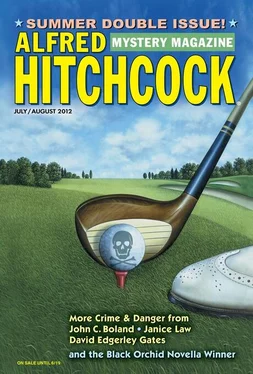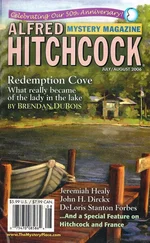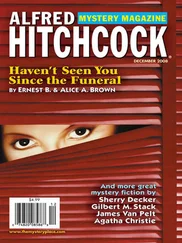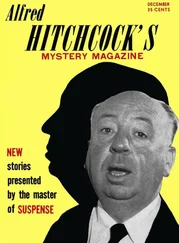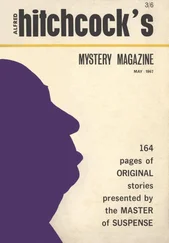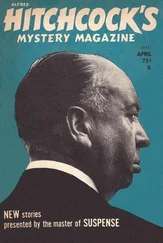Donald Moffitt - Alfred Hitchcock’s Mystery Magazine. Vol. 57, No. 7 & 8, July/August 2012
Здесь есть возможность читать онлайн «Donald Moffitt - Alfred Hitchcock’s Mystery Magazine. Vol. 57, No. 7 & 8, July/August 2012» весь текст электронной книги совершенно бесплатно (целиком полную версию без сокращений). В некоторых случаях можно слушать аудио, скачать через торрент в формате fb2 и присутствует краткое содержание. Город: New York, Год выпуска: 2012, ISBN: 2012, Издательство: Dell Magazines, Жанр: Детектив, на английском языке. Описание произведения, (предисловие) а так же отзывы посетителей доступны на портале библиотеки ЛибКат.
- Название:Alfred Hitchcock’s Mystery Magazine. Vol. 57, No. 7 & 8, July/August 2012
- Автор:
- Издательство:Dell Magazines
- Жанр:
- Год:2012
- Город:New York
- ISBN:0002-5224
- Рейтинг книги:3 / 5. Голосов: 1
-
Избранное:Добавить в избранное
- Отзывы:
-
Ваша оценка:
- 60
- 1
- 2
- 3
- 4
- 5
Alfred Hitchcock’s Mystery Magazine. Vol. 57, No. 7 & 8, July/August 2012: краткое содержание, описание и аннотация
Предлагаем к чтению аннотацию, описание, краткое содержание или предисловие (зависит от того, что написал сам автор книги «Alfred Hitchcock’s Mystery Magazine. Vol. 57, No. 7 & 8, July/August 2012»). Если вы не нашли необходимую информацию о книге — напишите в комментариях, мы постараемся отыскать её.
Alfred Hitchcock’s Mystery Magazine. Vol. 57, No. 7 & 8, July/August 2012 — читать онлайн бесплатно полную книгу (весь текст) целиком
Ниже представлен текст книги, разбитый по страницам. Система сохранения места последней прочитанной страницы, позволяет с удобством читать онлайн бесплатно книгу «Alfred Hitchcock’s Mystery Magazine. Vol. 57, No. 7 & 8, July/August 2012», без необходимости каждый раз заново искать на чём Вы остановились. Поставьте закладку, и сможете в любой момент перейти на страницу, на которой закончили чтение.
Интервал:
Закладка:
“Afterward, Virgil found the plate and the rest of the pie dumped in some bushes in the backyard. Our nephew Devlin has ADHD. He’s a tsunami on two legs and he’s constantly in trouble. We figured he probably had an accident getting the pie out of the refrigerator and just threw it away without telling anybody. So we decided not to say anything about it either.
“That day when you asked us about the pie, we realized you were thinking it might have been poisoned. Since we still had ice cream and cake left, we were afraid you might think it was funny that we didn’t also have some of the pie. I don’t know if you’re married, but, after so many years, a husband and wife can sort of communicate by telepathy — well, some of the time. Without a word spoken, Virgil and I decided between us to pretend there had never been a pie in the first place.
“And since you said you were going to be checking with Kevin and Sheeba, we called and give them a heads up. Sheeba even deleted some pictures from her camera that showed the pie.” Her sigh when she stopped for breath plainly signaled her relief at having confessed this atrocity. “We’re not really the kind of people who tell lies, especially to the police. I mean, your job is hard enough already—”
“Please don’t let it bother you, Mrs. Rentz. The fact is that the discrepancy between different people’s stories about the pie was the one and only reason we went ahead with the homicide investigation.”
Auburn made sure Dollinger had already had lunch when he passed along this final word on the chocolate pie.
Copyright © 2012 John H. Dirckx
Marley’s Rescue
by John C. Boland

Charles Marley was not a romantic, but when he was assigned to Casablanca he went looking for an American bar. It wasn’t Rick’s that he found but Bleecker East, owned by two émigré New Yorkers who had rented space on the ground floor of a hotel near Rue Foucauld. Whatever romance they had once felt for the city had worn off. The Moroccan currency was weak, capital exports were blocked, and the business the two men had built had become their captivity. If they left Morocco, it would be without their money. “It’s only been twenty Junes,” the younger owner said. He added, longingly, “Did you come from New York?”
“Paris,” Marley replied. He lied so reflexively that he barely noticed anymore. He hadn’t considered lying to be a character flaw since boyhood, and he had perfected the habit after joining the intelligence service in 1961. Twelve years later, that September in Casablanca, Marley would have been embarrassed if any truth had slipped out.
“Dennis Hyde,” the owner said, extending a hand across the bar. “Don’t believe anyone who tells you Casa is the Paris of North Africa.”
“I won’t,” Marley said. The commercial part of the city was French, but the architecture was blunt and charmless, the avenues wide and dusty. He had passed Customs twenty hours ago and already had decided he didn’t like the city. A few hours before that he had been in Cairo.
“They spot you as an American, half the people on the street will try to sell you hashish — or their sister or brother or mother,” Hyde said. He wasn’t more than forty-five, with a squarish face, deep-set blue eyes, curly hair. A side door of the saloon was open to the street, from which flies coasted in on afternoon light. The flies always came back, Orwell had said, but he’d been in the mountains, in Marrakech. In the port, from what Marley had experienced trying to eat lunch, the flies never left.
“Another beer?”
“Does Philip Rule ever stop in here?”
“There’s a Phil who comes in, probably not who you’re looking for.”
“Frizzy red hair, a beard?”
Dennis Hyde shook his head, but it was in disgust. “You’d find him down the street. He comes to Casa for the whores.”
There were three of them, standing together half-encircling Rule, who had his hands in his trouser pockets as he spoke to the young women in broken French. He noticed Marley and nodded him in. One of the girls, about five feet tall, shifted part of her slight weight, accepting him. She had curly black hair, a thin face, pale skin, small, graceful hands. “Her mother was turning her out when she was ten,” Rule said. “I was here two years ago, covering the regional econ meeting. You should have seen her then.”
The girl smiled at Marley. She had sweet eyes.
He patted his pockets and said, “No dirham .” The dirham was the local currency.
She smiled tolerantly. “No dirham, no nothing.”
Marley smiled, too, showing that he regretted the situation. At thirty-three, he had made it into adult life without having engaged a prostitute. There hadn’t been business with many women of any sort that went beyond flirtation. What he lacked, he knew, was the finesse to close a transaction. But he was without peer — so the people running him said — at seducing spies. Sometimes they said it in a sly way that seemed to imply something about him that Marley believed wasn’t true. He would know, wouldn’t he?
The other girls were older. He wasn’t a good judge of street-worn faces, couldn’t guess their years. They understood that he didn’t have any dirham, so they were ignoring him and joking with Philip Rule, who was lighting a cigar and puffing the smoke in their faces. If they minded they didn’t admit it. The tiny dark-haired girl had joined in. There was something elegant about her gestures, which Marley watched while he wondered which movie actress she had studied, how long it had taken the ten- or twelve-year-old mind to absorb the techniques that were meant to be charming, wondered if her mother had beaten the affectations into her, wondered if she believed any of it, if she actually hoped she was elegant as she stood on the dirty sidewalk and made her deals. He had a fanciful thought, which lasted no longer than it took to form, that he should take her away to somewhere safe. He didn’t know that it was too late for her, couldn’t be sure...
He felt the weight of the sunlight pressing on the back of his head, closed his eyes, opened them, as Phil Rule patted an older girl on the shoulder, broke off with his laughter already dead on his lips, and walked slowly, sharing the sidewalk with Marley, looking in doorways, smirking through his beard when he turned a glance on Marley. “I haven’t been paid in four months,” he said.
“You haven’t been producing.”
Puff on the cigar. “All you care, I could starve.”
“For all I care,” Marley said, “you can sell your body on the street like your friends. Your cable said you had something worthwhile.”
“And you came all the way from Cairo.”
It had to be a lucky guess; Rule couldn’t know where he had come from. There hadn’t been time enough in Cairo for anyone but the Russians to spot Marley, and they wouldn’t share information so quickly.
Rule went on, “There’s a Yugoslav freighter due in port in two days. The name is Tuhobic . There’s something on board you should see.”
“What is it?”
“A corpse.”
Marley said mildly, “A corpse. Why should I want to see it?”
“He was going by the name John Larkin,” said Rule, who glanced over and then, feeling confident, smiled at Marley the way he had smiled at the whores. “I thought you would be interested,” he said.
Phil Rule had a room several blocks away, at the Georges V, where he had tea brought up and sat with Marley in stifling heat with the balcony windows closed. “Larkin died at sea a couple of days after the ship left Havana, according to his wife. She’s a dancer, remember, Julianne Helgeson?”
Читать дальшеИнтервал:
Закладка:
Похожие книги на «Alfred Hitchcock’s Mystery Magazine. Vol. 57, No. 7 & 8, July/August 2012»
Представляем Вашему вниманию похожие книги на «Alfred Hitchcock’s Mystery Magazine. Vol. 57, No. 7 & 8, July/August 2012» списком для выбора. Мы отобрали схожую по названию и смыслу литературу в надежде предоставить читателям больше вариантов отыскать новые, интересные, ещё непрочитанные произведения.
Обсуждение, отзывы о книге «Alfred Hitchcock’s Mystery Magazine. Vol. 57, No. 7 & 8, July/August 2012» и просто собственные мнения читателей. Оставьте ваши комментарии, напишите, что Вы думаете о произведении, его смысле или главных героях. Укажите что конкретно понравилось, а что нет, и почему Вы так считаете.
